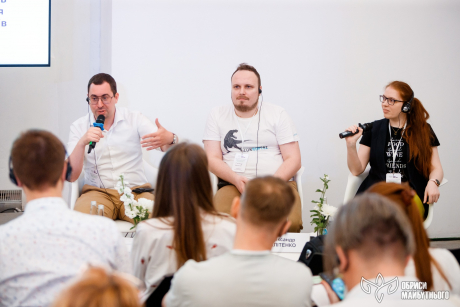Participation in Civil Society Forum

May was a busy and productive month for UNIC and other NGOs, as many of us prepared for the Ukraine Recovery Conference in London. In addition, during the same period, UNIC successfully held a number of events within Business Integrity Month, including one of our partner events at the Civil Society Forum "Shapes of the Future: Victory, Recovery, and Modernization of Ukraine "*, organized by Isar Ednannia.
Thus, at the Forum, UNIC organized a special section on "How not to lose the opportunity to receive funding from international partners for recovery by managing CSO risks.» In this section participated Yuliia Vrublevska, UNIC Project Coordinator, as well as representatives of the UNIC member and partner Pavlo Verkhnyatskyi, Managing Partner of COSA, and Oleksandr Kalitenko, Legal Advisor at Transparency International Ukraine.
Participants discussed general approaches to risk management in civil society organizations, including implementing policies and practices necessary for the sustainability of the organization's work/development and cooperation with international partners.
Here are the notes from the UNIC and answers to questions from the participants - representatives of the public sector:
- Usually, non-governmental organizations do not have one ultimate beneficial owner. However, an initiative group or supervisory board often founded the organization. Potential funders usually ask about related parties, so it is important to clearly identify them, even if there is no specific owner. When searching online, it is easy to find information about the organization’s founders or management, so it is better to be transparent in this regard. In addition, grantmakers often ask for historical information about the organization. It is worth mentioning events and changes in leadership over the past 5 years. If they are no longer active in the organization, you can point out that their contribution was significant before, but now they focus on other things or projects.
- In addition to completing questionnaires or forms, some international organizations may require additional monitoring meetings to ensure that the organization is functioning, has capable staff, and can fulfill contracts (e.g., when it comes to large amounts of funding or long-term institutional support). In addition, some international technical assistance projects require contractors to be approved by the grantor's legal department so that you may receive a call directly from the international organization with questions about your activities in the project and the cooperation details.
- It is important to note that if an international or financial institution finds negative information about your partner or employee that you cannot explain during the audit, it will raise questions about the effectiveness of your internal policies, in particular, about the verification of counterparties and the process of recruiting personnel, as well as the availability of internal resources for anti-corruption audits. In general, this may raise questions about the organization's ability to effectively implement projects and the extent to which you adhere to the integrity principles.
- In the public sector, it is recommended for smaller organizations to have a Code of Conduct and Ethics that includes the standards and principles that apply to your organization. It may detail fraud prevention, conflict of interest, and the proper use of funds. In large organizations, it is wise to develop a number of policies, such as procurement policies, counterparty due diligence policies, anti-corruption and human resources policies, and whistleblower policies. These policies should be practical tools to minimize the risk of fraud and misuse of funds in all organizations, regardless of size or the number of contractors or employees. It is important to prove to an international organization or financial institution that provides funding that your fraud prevention system is functioning effectively, even if it consists of only one documented policy. At the same time, it is implemented in practice and understood and applied by employees, which is an important factor in obtaining funding.
*It should be noted that UNIC is constantly involved in educational partnerships with non-governmental organizations. In particular, with its members, UNIC promotes an integrity culture in the public sector and raises awareness of NGOs implementing compliance controls.




